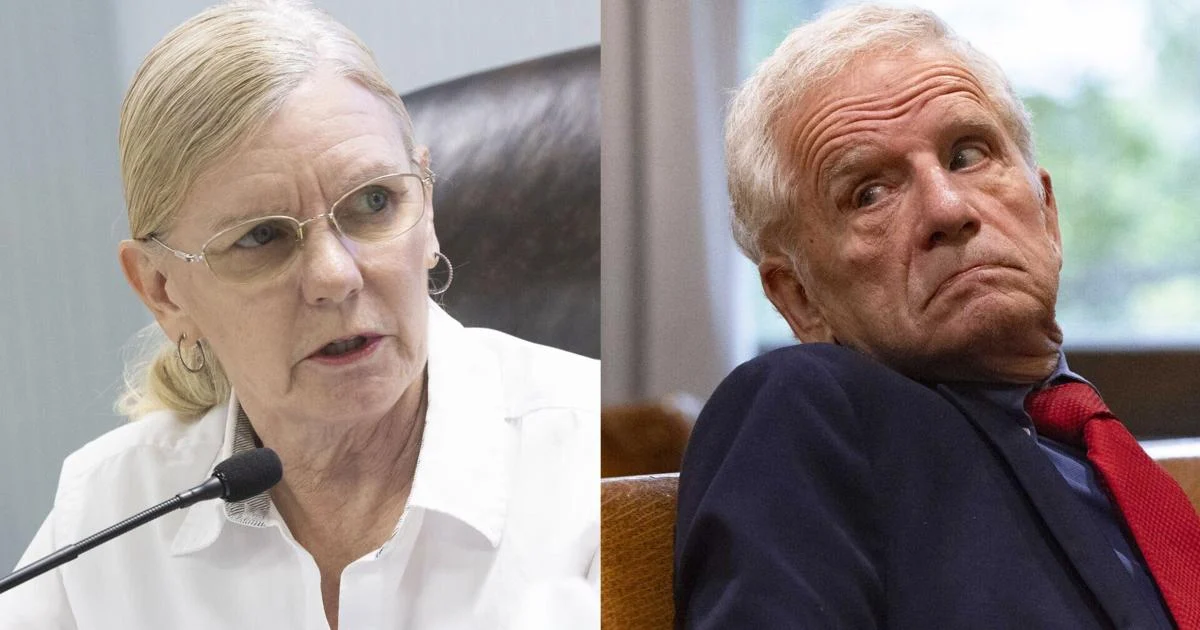
As fallout from an internal human resources investigation into the Public Service Commission president drags on, the commission’s vice president is trying to make it easier for commissioners to suspend and remove their fellow members.
Public Service Commission (PSC) Vice President Jennifer Fielder on Wednesday circulated amendments to the commission’s code of conduct that would, among other changes, lower the vote threshold from four out of five commissioners to three out of five in order to remove the commission’s president or vice president, censure a commissioner or send a formal complaint to the governor about a commissioner.
These proposed rule changes, which were obtained by the Montana State News Bureau, come as PSC President Brad Molnar is the subject of an internal HR investigation looking at his workplace conduct. Once he learned of the investigation earlier this summer, he publicized it, lawyered up and, according to PSC staff and some commissioners, has intentionally gummed up the process and retaliated against those involved.
The PSC is responsible for regulating the state’s monopoly utility companies, such as NorthWestern Energy.
Following Molnar’s pushback, Fielder quietly and without holding a vote sent a formal letter to Gov. Greg Gianforte asking him to temporarily suspend Molnar as the internal investigation continues. Molnar sued her and Gianforte, claiming that the request was invalid because the five-member commission did not hold a vote on the matter. It is unlikely the move to send the letter would have passed the four vote threshold assuming that Molnar and a frequent ally of his, Commissioner Randy Pinocci, would vote against it.
A state district court judge initially sided with Molnar in the case and is set to issue a more permanent ruling in mid-October.
Fielder’s proposed rule change also includes language that would provide considerable power to the internal PSC team investigating the HR complaints, including the ability for that team to contact the governor without holding a vote and request the temporary suspension of a commissioner if he or she is “interfering … or engaging in retaliation.”
“Fielder wants to make overturning PSC elections easier because her first attempt was too sloppy to succeed,” Molnar’s attorney, Matthew Monforton, said in an email. “We’ll keep making sure the court and Montana ratepayers know exactly how she operates, by breaking rules in secret then trying to rewrite them when caught.”
This is a first-of-its-kind squabble at the PSC: A section of Montana law specific to the PSC includes a provision that gives the governor the ability to suspend a commissioner following a formal complaint, but that law has not been tested until now, according to the PSC’s former staff attorney.
The removal, censure and the complaint to the governor are some of the only items before the PSC that require a four-vote majority, while most other items, including amending the internal rules as Fielder is attempting to do, require only three votes.
“While I cannot speak to what motivated the proposed changes, to my knowledge, there are no other procedures in the [internal policy manual] that require four out of five votes from the Commissioners,” PSC Executive Director Alana Lake said in an email when asked what spurred the proposed amendments. “It is possible that this change is intended to align this section with the rest of the policy.”
Fielder did not respond to multiple requests for comment, including if she plans to hold a vote on removing Molnar, censuring him or sending another letter to Gianforte requesting his suspension.
It is unclear exactly why Molnar is under investigation; the PSC has repeatedly cited confidentiality rules when asked to explain what he is being accused of. The PSC secretary and Fielder’s attorney, however, have indicated that he has engaged in “discriminatory speech, retaliatory speech” and “harassment,” including “sexually charged” comments.
Asked if he believed lowering the vote threshold was necessary for commissioners to safeguard the body against retaliation and intentional interference, Monforton said “absolutely not.”
“The four-vote supermajority requirement exists precisely to prevent what we’re seeing now – commissioners turning suspension complaints into personal vendetta tools against colleagues who won’t play ball with big utilities,” he added.
A proposed rule change requires 30 days notice and must be decided at a public meeting.
Victoria Eavis is a reporter for the Montana State News Bureau. She previously worked for the Casper Star-Tribune in Wyoming, covering state politics and Liz Cheney’s fall from power. She can be reached at victoria.eavis@helenair.com.
You must be logged in to react.
Click any reaction to login.
Love
0
Funny
0
Wow
0
Sad
0
Angry
0
Get Government & Politics updates in your inbox!
Stay up-to-date on the latest in local and national government and political topics with our newsletter.
* I understand and agree that registration on or use of this site constitutes agreement to its user agreement and privacy policy.
Victoria Eavis
State Bureau Reporter
Get email notifications on {{subject}} daily!
Your notification has been saved.
There was a problem saving your notification.
{{description}}
Email notifications are only sent once a day, and only if there are new matching items.
Followed notifications
Please log in to use this feature
Log In
Don’t have an account? Sign Up Today



